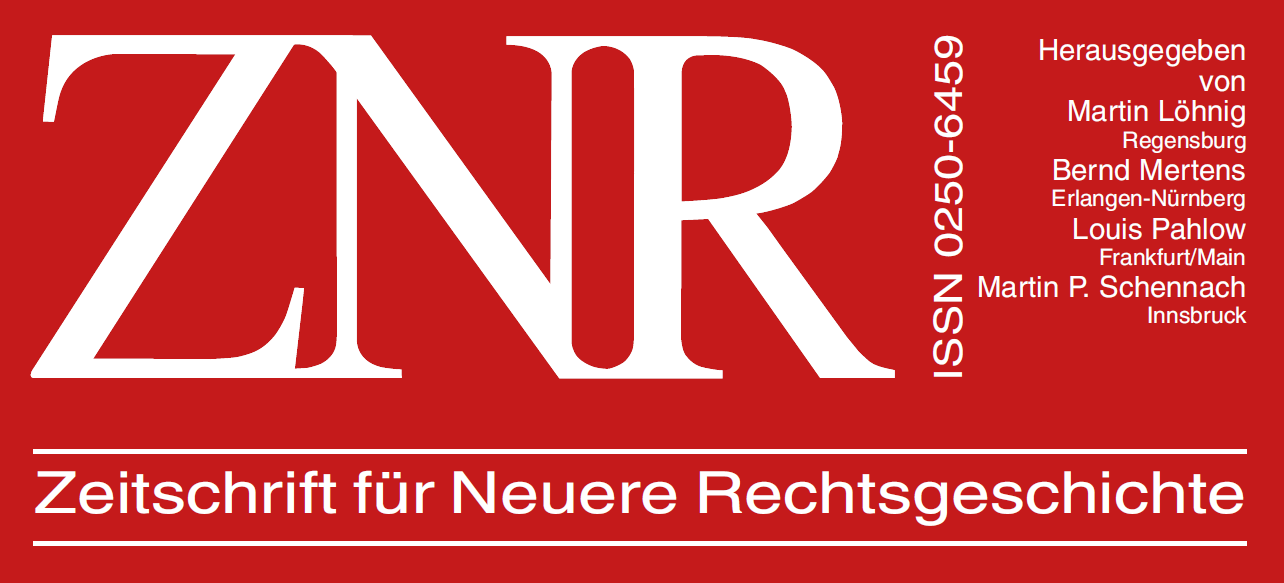Beiträge
- ANDREAS DEUTSCH, Heidelberg
Die große Suche nach dem Rechtswortschatz. Zu den Anfängen des Deutschen
Rechtswörterbuchs vor 125 Jahren, in: ZNR 44 (2022), S. 177–217
In 1897, 125 years ago, one of the most comprehensive research projects in German legal history was established: the „Deutsches Rechtswörterbuch“ (DRW). With 100,000 concluded entries in 14 volumes, this extensive dictionary of historical German (and West Germanic) legal terminology these days is considered the most comprehensive reference work on a German technical language. The paper deals withthe founding phase and the first decades of the research project – until the death of Eberhard von Künßberg (1881–1941), who probably shaped the dictionary like no other. Driven by a great euphoria, the project was a magnet for integration in German legal history from the very beginning. For the initial phase alone, more than 700 people were be made out to have participated, most of whom volunteered as excerptors. Specific commissions were set up in the Netherlands, Switzerland and Austria to support the project. Located at the intersection of law, language and history, the DRW not only stood for interdisciplinarity from the beginning, but also a remarkable number of women contributed to it.
- ERNEST C. BODURA, Wien
Die Reform der Juristenausbildung in Deutschland im Jahre 1896 aus der Perspektive der galizischen Romanisten, in: ZNR 44 (2022), S. 218–241
The „Conference of German Law Professors“ held in Eisenach in March 1896 brought about a drastic change in the teaching of private law at the law faculties in the German Empire. The lectures on pandects, which dominated the traditional law curriculum, were to be replaced by lectures on the new Bürgerliches Gesetzbuch (BGB). This reform agenda aroused great interest also beyond the borders of Germany, notably in Austria. It was a characteristic of the Austrian legal literature of the time that, in addition to the legal literature in the German language –which undisputedly made up the largest part of the legal literature in Austria – there was also a legal literature beyond the German language, for example in Polish, Czech, Italian, and Ruthenian (Ukrainian). This contribution will deal with the question, how the reformof legal teaching in Germany adopted at the Eisenach Conference of March 1896 was reflected in the Polish-language legal literature of the then Crown Land of Galicia. Particular emphasis will be givento the views of the two Galician Romanists F. Zoll the Older (then Professor of Roman Law at Krakow) and S. Wróblewski (then a young lecturer in Roman Law, who had just completed his habilitation [second doctorate required for a university career]). As early as 1900, the two Krakow Romanists engaged in an interesting and quite revealing controversy. The subject of their discussion were the consequences that would result from the Eisenach decisions with regard to the teaching of Roman law in Austria.
- LEON SCHERFF, Augsburg
Hundert Jahre Verwaltungsgerichtsbarkeit in Hamburg: Die erste Verwaltungsgerichtsbarkeit im modernen Sinne auf deutschem Boden?, in: ZNR 44 (2022), S. 242–253
On February 1st, 1922, thefirst administrative courts in Hamburg began their work. The administrative jurisdiction in Hamburg celebrated its hundredth birthday on February 1st 2022. On closer inspection, it reveals several innovations that were quite remarkable for that time. It can be stated that the administrative jurisdiction in Hamburg formed the starting point for a modern administrative jurisdiction in Germany. This thesis is examined using criteria that are constitutive of a modern administrative jurisdiction.
Diskussion
- GERALD KOHL, Wien
Meister, Mythen und Miseren: Der Tod der Meistererzählungen und die Fragmentierung der Rechtsgeschichte aus einer österreichischen Perspektive, in: ZNR 44 (2022), S. 254–271
Forschungsbericht
- CHRISTIAN NESCHWARA, Wien
100 Jahre österreichisches Bundes-Verfassungsgesetz: Ein Werk für die Ewigkeit? Rückschau auf die zum Jubiläum erschienene Literatur, in: ZNR 44 (2022), S. 272–284
Länderbericht
- MARK GODFREY, Glasgow
Scottish Legal History 2001–2022: a Select Bibliography, in: ZNR 44 (2022), S. 285–301
Literatur
- Graeme Gooday – Steven Wilf (Hrsg.), Patent Cultures. Diversity and Harmonization in Historical Perspective. Cambridge Intellectual Property and Information Law, Cambridge 2020 (Louis Pahlow), in: ZNR 44 (2022), S. 302–304
- Alexander Ihlefeldt, Carl Bulling (1822–1909). Pandektist und Vordenker der Gleichberechtigung, Göttingen 2020 (Martin Löhnig), in: ZNR 44 (2022), S. 304–305
- Josef Isensee, Grenzen. Zur Territorialität des Staates (= Wissenschaftliche Abhandlungen und Reden zur Philosophie, Politik und Geistesgeschichte 94), Berlin 2018 (Hans-Christof Kraus), in: ZNR 44 (2022), S. 305–306
- Dieter Langewiesche, Vom vielstaatlichen Reich zum föderativen Bundesstaat. Eine andere deutsche Geschichte (= Heidelberger Akademische Bibliothek 5), Stuttgart 2020 (Franz Hederer), in: ZNR 44 (2022), S. 307–308
- Julian März, Zwischen Laizismus und Religionsfreiheit. Das Religionsverfassungsrecht der Dritten Französischen Republik im Vergleich mit der Weimarer Republik (= Schriften zur Rechtsgeschichte 197), Berlin 2021 (Wilhelm Rees), in: ZNR 44 (2022), S. 308–311
- Dennis Julien Rein, Altrechtliche Grunddienstbarkeiten (= Schriften zum Bürgerlichen Recht 523), Berlin 2021 (Georg Suppé), in: ZNR 44 (2022), S. 311–312
- Maren Sievert, System im Umbruch. Gestaltung der Grundpfandrechte in der badischen Praxis im Übergang zum BGB (= Schriften zur Entwicklung des Privatrechtssystems 13), Baden-Baden 2021 (Susanne Karoline Paas), in: ZNR 44 (2022), S. 312–314
Zeitschriftenschau, in: ZNR 44 (2022), S. 318–352
